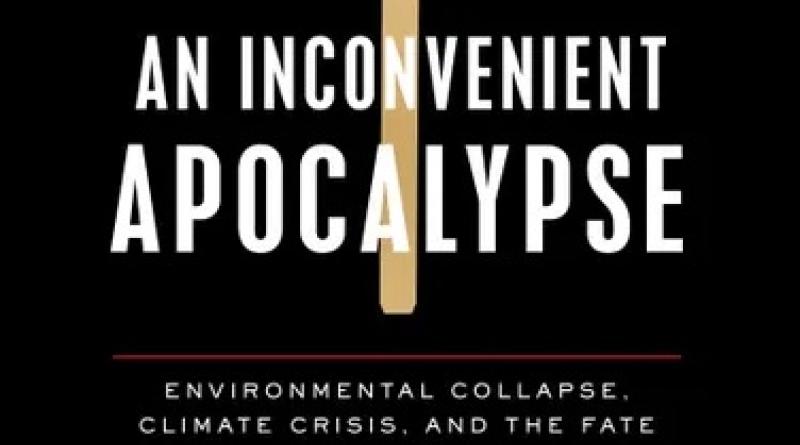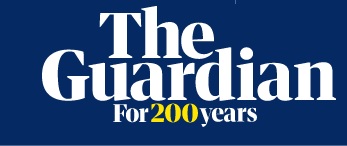‘We’re going to pay in a big way’: a shocking new book on the climate crisis

In An Inconvenient Apocalypse, authors Wes Jackson and Robert Jensen write that society needs to be better prepared for an inevitable collapse
In An Inconvenient Apocalypse, authors Wes Jackson and Robert Jensen style themselves as heralds of some very bad news: societal collapse on a global scale is inevitable, and those who manage to survive the mass death and crumbling of the world as we know it will have to live in drastically transformed circumstances. According to Jackson and Jensen, there’s no averting this collapse – electric cars aren’t going to save us, and neither are global climate accords. The current way of things is doomed, and it’s up to us to prepare as best we can to ensure as soft a landing as possible when the inevitable apocalypse arrives.
“The book tries to be blunt and honest about the depth of the crisis,” said Jensen, “and to be blunt and honest about the current solutions, which do nothing to deal with the depth of the crisis.” Jackson added: “Now humanity is on a whole different journey than a gathering-hunting society. I saw that we were going to pay for this some day, and we’re going to pay in a big way.”
Jackson and Jensen make for an interesting pairing. The former is an agronomist, having spent his career studying the problem of soil erosion and developing The Land Institute, which seeks to develop grains that can be used for sustainable agriculture. For his efforts he has garnered a MacArthur “genius” grant and a Right Livelihood Award, among other honors. Jensen is a longtime journalist who has written books on ecology, masculinity and radical feminism. He has received backlash for propounding exclusionary and harmful views against transgender people, specifically targeting transgender women, and in response to the criticism he has doubled down on these viewpoints, continuing to promulgate them.
In Jackson and Jensen’s view, the dawn of agriculture represents something like original sin. This is what got humanity on to the course of increasing energy use and material wealth that has brought us to the current ecological crisis. Via this reading of human history, the authors seem to be arguing that our trajectory as a technological species capable of high energy use and large-scale agriculture is a mistake that has taken us to a place we never should have been, and has doomed us. In conversation Jackson endorsed this viewpoint, telling me that our way of life has us “caught in a big Ponzi scheme that we’ve probably had for 10,000 years. We know how Ponzi schemes tend to end. They’re not nice things to have to deal with.”
The answer to this Ponzi scheme involves shrinking humanity from the current 7.7 billion people to a more sustainable 2 or 3 billion. An Inconvenient Apocalypse doesn’t describe how exactly this decline in population will occur, nor reckon with the enormous trauma that the elimination of the majority of humanity will inflict on humans and our societies. Although the book is nominally oriented toward social justice, the authors make no effort to address the fact that such a population decline would probably be an absolute disaster for marginalized ethnicities and sexualities, those who are disabled or mentally unwell, and basically anyone not deemed fit for survival in the new world. In conversation, Jensen offered this explanation:
“A lot of past talk of population control has been based in white supremacy, but that doesn’t mean we can ignore the question of what’s a sustainable population. That’s the kind of thing that people have bristled against. We don’t have a solution. But the fact that there aren’t easy and obvious solutions doesn’t mean that you can ignore the issue.”
According to Jackson and Jensen, once the collapse occurs and the Earth’s population declines, it is up to humans to figure out how to live in a “low-energy” future – that is, one where fossil fuels are no longer used and we essentially are back to relying on our own muscles and those of beasts of burden. In terms of what that low energy world might look like, An Inconvenient Apocalypse articulates an ethos that might be summed up as the paleo diet, but for society. Because 10,000 years of so-called progress has left us in “dire straits”, the answer involves looking back to the prehistoric millennia before humans developed agriculture, began writing down their history, and built societal hierarchies. Insofar as An Inconvenient Apocalypse describes how this future could look, it involves tradespeople and agricultural workers elevated to the high-status ranks of society, the affluent getting taken down some notches, a wholesale elimination of the cosmopolitan, consumerist world, and religion playing a prominent role. One is tempted to sum it up as “make the Earth great again”.
The world of An Inconvenient Apocalypse is a very bleak one, and also one with no middle ground. The authors write that “the future of continued endless expansion that we have long imagined is over and a new future defined by contraction is coming”. Any attempt to find some kind of middle way through these two poles is simple “denying, minimizing and ignoring” a problem that we must all face. The emphasis on this book is on being blunt and stating truths that the authors believe to be self-evident – there is little effort by Jackson and Jensen to argue their case or to convince others. To be fair, Jackson and Jensen seem to be aware that their style will put off many, stating their expectation that many readers will simply abandon their book. Jensen said: “We set out to write a book that, in some sense, everybody will have a reason to dislike.”
For a book predicting the mass death of most of humanity and the end of life as we know it, An Inconvenient Apocalypse is chillingly cerebral. There is virtually no room for acknowledging – much less processing – the emotional toll that such a message will take on both the authors and their readers. That can make the book feel cold and condescending. In conversation, Jensen showed more vulnerability, offering some of the feelings that his vision for humanity raised within himself. In this reader’s opinion, letting this vulnerability through more often in An Inconvenient Apocalypse would have made for a more relatable and ultimately more compelling read.
“I’ve wrestled with what this means in everyday life,” and Jensen, “and these are distressing questions. It’s about wrestling with that sense of grief, rather than trying to avoid it. And when you wrestle with that, it means you don’t wake up every day on the sunny side of the street. It’s weighing on a lot of us. My goal is just try to open up space for people to say what’s on their mind.”
-
An Inconvenient Apocalypse is out on 1 September
cover photo: Photograph: University of Notre Dame Press




